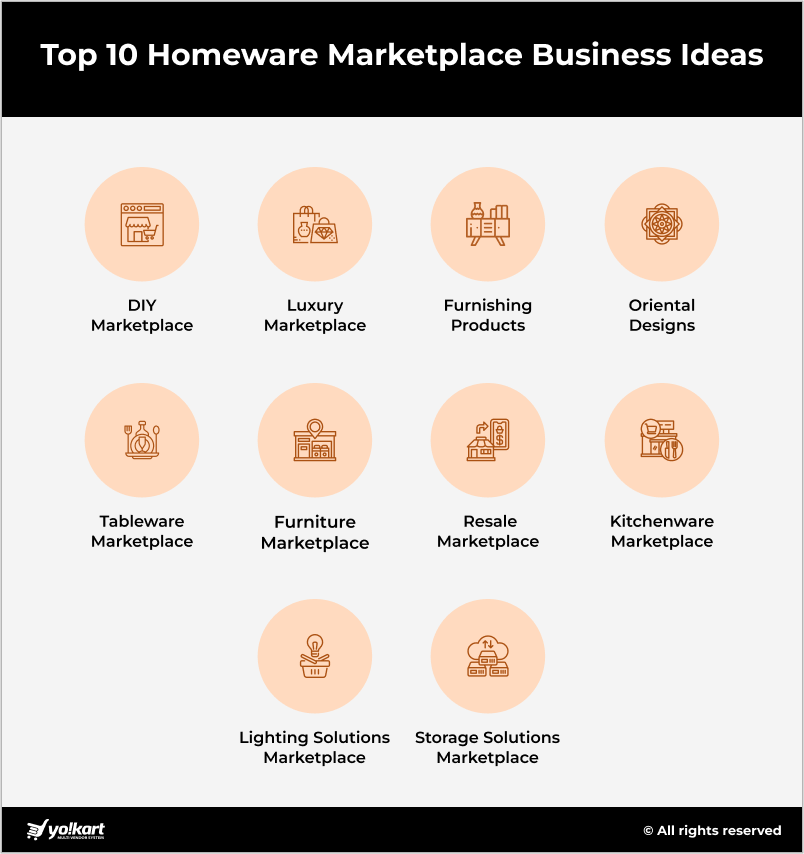The Global Homeware market is a vast domain. Whether you categorize it by the type of products, distribution channels, area of application, buyer intent, or others ÔÇò you can come up with multiple definitions of what you would call a typical homeware marketplace. This is especially true if you consider it from a buyer’s perspective. There are few all-in-one stores, whether online or offline, that sell everything.
Collectively, the homeware industry is growing at a CAGR of 5.8%. A big reason for the growth was the impetus given by the pandemic crisis. With more time spent at home, buyers rediscovered their lost love for their homes. Now with the convenience of eCommerce redefining how and where they shop, the industry was further injected with fresh opportunities for businesses.
That said, as far as online channels go, the homeware industry is still in its nascency ÔÇò with a handful of players commanding a chunk of the market share. So, in this blog, letÔÇÖs understand the intricacies that shape this market. With this information, you will have a starting point for your journey to start online homeware marketplace.
Table Of Contents
Homeware Retail ÔÇò The Industry
The Homeware industry includes products such as kitchenware, furniture, tableware, bedding, home decor, soft furnishing, bathroom accessories, lighting, hardware tools, storage solutions and a lot more. So everything that buyers need to enhance their homes, from a big furniture item like a bed to a tiny decorative product such as a bedside lamp to a functional product like a hand drill, all comes under this industry.
According to Data Bridge market research, the homeware industry is projected to reach USD 2165.24 million by 2029, at a growth rate of CAGR 5.8%, as mentioned above. In this growth, the Asia-Pacific region is leading the charge, followed by Europe and then North America. However, in terms of churn, the North American region is the fastest market.
Traditionally, homeware has been sold in hypermarkets & supermarkets, franchisee stores, speciality stores, and others. However, in recent times, online channels have emerged as a leading distribution channel solution for Homeware products. These online channels comprise dedicated eCommerce stores, niche marketplaces, and finally horizontal marketplace channels.
Upcoming Trends in the Industry
Global society is going through a transformative shift with the key driver, again, being the pandemic. For instance, remote work has introduced an increased focus towards utility-driven multi-functional concepts. Furthermore, there are some more trends in the industry that upcoming businesses in the industry can focus on. LetÔÇÖs discuss these below:
Efficient Space Utilization: With growing urbanization, dwellings are getting cramped, making space a premium commodity that has to be managed. Cleverly designed products that maximize space and utility have an increased user demand.
Sustainable choices: With the climate crises throwing caution to the winds with drastic weather pattern shifts, an expanding customer base is now choosing sustainable products over others. These products are transcending product categories to attract a mass appeal.
Tech-enabled Homes: IoT devices have spread across multiple product categories, to find applications in a plethora of smart devices. Modern consumers want control of these devices through their mobile devices or voice-enabled controllers.
The appeal of Brands: Trendy Home decor appeals to user sensibilities like fashion does. So just like the latter, this industry is also witnessing developing brands like H&M offering their range of products. Moreover, celebrities are also launching their brands in this segment. For instance Kravitz design by Lenny Kravitz.
The significance of social media: Social media has come to exert a significant influence on the lives of the masses. While this has driven consumer habits across retail sectors, the homewares industry too has gained in many ways. Some of these are discussed in the next section.
Leverage latest trends by starting with a Homewares Marketplace
Top 10 Homeware Marketplace Business Ideas
The Homeware industry is a multi-faceted, growing ecosystem with a global footprint. Moreover, as an eCommerce market, this industry is maturing with more and more consumers looking to source their needs from online channels.

Here are some innovative ideas to launch your Homewares Marketplace.
1. DIY Marketplace for Homewares
A Do-It-Yourself marketplace is an online platform where users can buy and sell DIY products. DIY is one of the product categories that has largely gained from the popularity of social media. Such a marketplace platform works similarly to a P2P marketplace like Etsy.
Popular player: Home Depot
A renowned name in the industry, Home Depot is a home improvement retailer operating in the US and some international markets. It offers a wide range of products that are needed for DIY projects and also professional contractors. In this, it has hardware like tools, construction materials, related appliances, and other home improvement product ranges.
2. Luxury and high-ticket products Marketplace
This is a homeware marketplace platform for exclusive products catering to buyers considering premium, high-end home decor and household items. The sellers here offer a curated selection of luxurious product line-ups, providing a sophisticated and elegant shopping experience similar to high-end department stores.
Popular Player: Artemest
An eCommerce platform for Italian handcrafted luxury homeware products. It gives the globally famed Italian craftsmanship a window to the world. It ships these premium Home Decor products to locations across the world.
Start a Luxury Homeware Products Marketplace with an appealing UI
3. Soft Furnishing Products Marketplace
A marketplace platform for soft furnishings allows buyers and sellers to engage in home items such as pillows, curtains, bedding, and other home decor products. These essentially are product categories within homewares that include wide-ranging products that add comfort, style, and functionality to the buyersÔÇÖ homes. These marketplaces find buyers in homeowners and interior designers considering enhancing the aesthetic appeal of homes, while sellers, both smaller businesses and bigger brands get a big audience.
Popular player: Wayfair
Wayfair is one of the largest homeware marketplaces that operates only online. It offers a selection of homeware products, with a distinct focus on a range of soft furnishing products.
4. Homeware Marketplace with Designs from the Orient
Countries like China and India are not just manufacturing hubs in the present times, but also have a rich cultural heritage dating back to the ancient era. Designs from these countries have an oriental charm that finds a place in themed interiors in the West. Many sellers from these countries are already operating via eCommerce platforms such as Etsy, and shipping to regions such as North America and Europe. Hence, dedicated online platforms have a good opportunity to give these sellers an exclusive ecosystem to engage with the buyers.
Popular player: Crafts n Chisel
A marketplace based out of India offering ethnic home decor products and more to buyers in countries such as the US.
5. Tableware Marketplace
A tableware marketplace offers buyers a platform to buy high-quality dining essentials. Tableware includes multiple product categories such as dinnerware sets, cutlery, glassware, serving dishes, linens, and more. Typically, such platforms cater to homeowners, restaurateurs, and event planners.
Popular Player: Arc International
A France-based marketplace by Arc Global, this is a leading Homewares eCommerce platform that focuses specifically on Tableware products.
6. Furniture and Home Goods Marketplace
A furniture and goods marketplace can host furniture products like sofas, chairs, tables, beds, and more. Moreover, such a platform can also offer home decorations. This niche in itself has broad application. Furniture can range from practical, to luxurious, to handcrafted, and a lot more. Apart from just design, the success of marketplaces like IKEA demonstrates the value of smart packaging as a USP for the target audience. Hence a furniture marketplace can be designed to offer products in several ways.
Popular Player: IKEA
This Swedish conglomerate is renowned for being a hub for well-designed furniture and home goods marketplace products. Additionally, as mentioned, it has pioneered the concept of flat-packaging and self-assembly, which add more value to its unique market positioning.
Suggested Read: An insiderÔÇÖs guide to building a furniture marketplace
7. Furniture Resale Marketplace
Unlike some of the other products in the Homewares industry, furniture products do have a significant cost factor. Moreover, owing to the large size of these items, consumers who want to replace their existing furniture, need a bigger platform than just their garden-sales space. Unsurprisingly, with robust supply and demand, the furniture resale industry is expected to reach US$ 58.58 bn by 2030, growing at a CAGR of 7.80%. Furniture resale marketplaces are typically P2P platforms that connect both the sellers and buyers for this need.
Popular Player: 1stDibs
1stDibs is a re-commerce marketplace that allows users to sell used furniture, especially if it is unique or vintage. Its user base includes end-consumers, dealers, galleries, antique shops, and others.
Suggested Read: Guide to start a furniture resale marketplace
8. Kitchenware Marketplace
A kitchenware marketplace is a platform dedicated to the sale of kitchen products such as from cookware, bakeware, kitchen tools, appliances, and dining essentials. It provides consumers, chefs, eateries, and others with an online source to buy all kitchen-related needs. With entire product categories dedicated to kitchenware, the marketplace can offer buyers products ranging from common items to products that are rare to find.
Popular Player: EverythingKitchen
This is a US-based kitchenware that was founded by a single woman (Emily Church) for just $500. In present times, the Kitchenware marketplace has now scaled to nationwide operations, backed by a sprawling warehouse.
Check the viability of Kitchenware Marketplace in your region
9. Lighting Solutions Marketplace:
An integral part of interior design is the lighting of the space. It adds a new dimension to the styling of the space: serving multiple purposes ranging from utility to aesthetics to customization of the ambience. A lighting solutions marketplace can include indoor and outdoor lighting, decorative lighting, smart lighting solutions, unique designs, and more.
Popular Player: Lampenwelt
It is a lighting solutions marketplace founded in Germany in the year 1999. It has a presence in 26+ countries as a preferred choice for a variety of lighting solutions.
10. Storage Solutions Marketplace
Urban lifestyles are evolving. As real estate prices jump up, the cities have started growing vertically. Moreover, with the increasing disposable income of the middle class, globally, the need for more efficient workspaces is growing by the day. To add to this, the increasing current trend of remote working requires a more contemporary, efficient, and innovative approach to Home decor. This is one of the better-performing niches in many Horizontal marketplaces like Walmart, Amazon, and others. However, since niche marketplaces have an edge with a more specialized product base. Hence it can be a good opportunity for entrepreneurs to research the viability of a Storage solutions marketplace in their target region.
Popular Player: Burrow
Burrow isnÔÇÖt a typical storage solutions marketplace. However, it applies this concept of efficient Home solutions to furniture. At its core, it uses modular innovation in furniture ÔÇò making it ideal for contemporary home spaces.
Wrapping Up
These were the upcoming trends and the top 10 business ideas in the Homeware marketplace industry. With the impetus received in recent times and increased consumer demand, starting a Homeware marketplace in any of these niches can be profitable. However, since the homeware industry is vast, it is prudent to conduct market research and competitive analysis in the region you want to operate.
This can help you understand which business will be more viable than others. Once you have the business idea in mind, ensure that you move quickly to grab the market opportunity. In your entrepreneurial journey, we can help you with readymade eCommerce marketplace software that can help you in starting your homeware online business in a quick, cost-efficient way, and impactful way.



